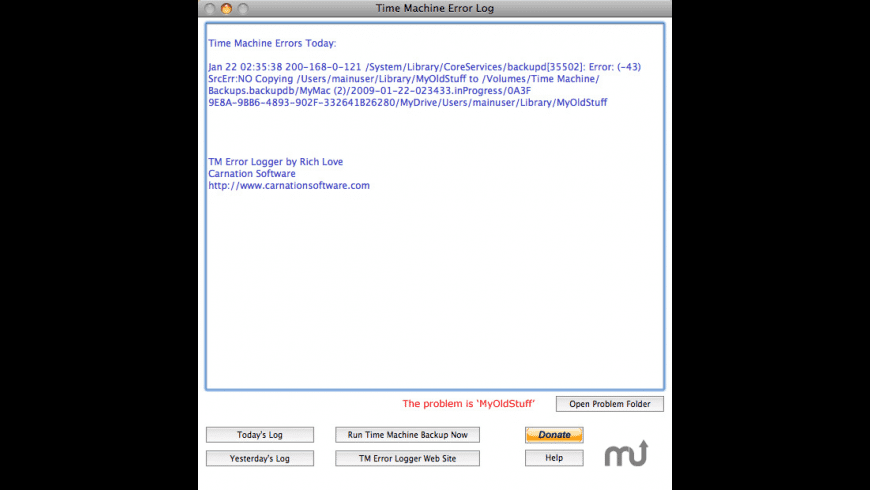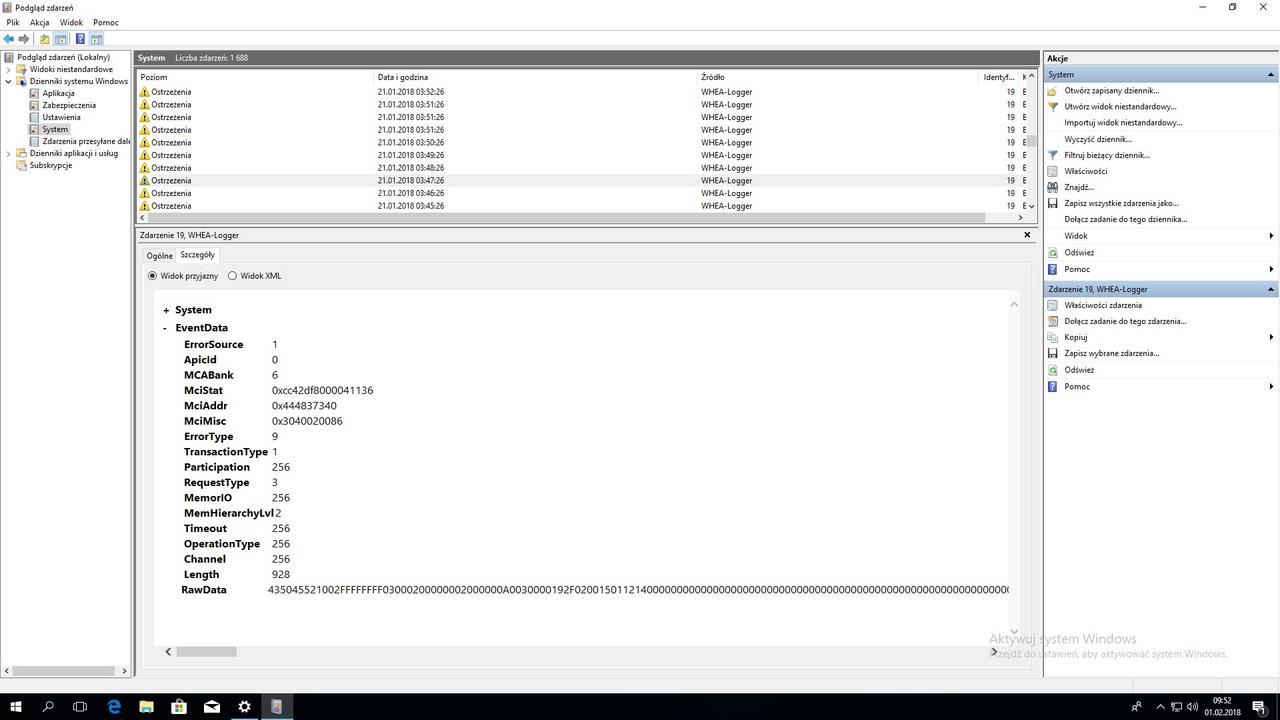- You are downloading TM Error Logger for Mac, version 7.0.1. The package you are about to download is authentic and was not repacked or modified in any way by us. Each download we provide is subject to.
- A Public Service Agency REG 31 (REV. 10/2018) WWW VERIFICATION OF VEHICLE NOT TO BE COMPLETED BY APPLICANT To be acceptable by DMV, this form must be legible, hand printed in black or blue ink, and completed IN FULL by an authorized DMV representative.
- Tm Error Logger Google
- Tm Error Logger Free
- Tsm Error Log
- Tm Error Logger Iphone
- Tm Error Logger Windows 10
TM Error Logger is a Time Machine error-reporting program. Do you get those Time Machine Error alert messages and wonder why? Would you like to find out exactly what caused the error so you can do something about it? Run TM Error Logger after you get the Time Machine error and you will get a report showing which file or folder caused the error. Click on 'Open Problem Folder' to reveal the folder.
-->This article describes an issue in which the TPM device driver is recorded in the system log when it experiences an unrecoverable error.
Original product version: Windows 10 – all editions
Original KB number: 4562894
Symptoms
On a TPM device, you experience issues with BitLocker, logging to applications using Modern Authentication or Next Generation Credentials. These messages are logged in the event logs:
- The Trusted Platform Module (TPM) hardware failed to execute a TPM command.
- The device driver for the Trusted Platform Module (TPM) encountered a non-recoverable error in the TPM hardware, which prevents TPM services (such as data encryption) from being used.
See the following log examples for detailed information:
Event ID 14
Log Name: System
Source: TPM
Date:
Event ID: 14
Task Category: None
Level: Error
Keywords:
User: SYSTEM
Computer: WIN10PC.CONTOSO.COM
Description:
The device driver for the Trusted Platform Module (TPM) encountered a non-recoverable error in the TPM hardware, which prevents TPM services (such as data encryption) from being used. For further help, please contact the computer manufacturer.
Event Xml:
<Event xmlns='http://schemas.microsoft.com/win/2004/08/events/event'>
<System>
<Provider Name='TPM'>
<EventID>14</EventID>
<Version>0</Version>
<Level>2</Level>
<Task>0</Task>
<Opcode>0</Opcode>
<Keywords>0x8000000000000000</Keywords>
<EventRecordID>55474</EventRecordID>
<Correlation />
<Execution ProcessID='4' ThreadID='284' />
<Channel>System
<Computer>WIN10PC.CONTOSO.COM</Computer>
<Security UserID='S-1-5-18' />
</System>
<EventData>
<Data Name='locationCode'>0x2c000230</Data>
<Data Name='Data'>255</Data>
</EventData>
</Event>
Event ID 17
Log Name: System
Source: TPM
Date:
Event ID: 17
Task Category: None
Level: Information
Keywords:
User: SYSTEM
Computer: WIN10PC.CONTOSO.COM
Description:
The Trusted Platform Module (TPM) hardware failed to execute a TPM command.
Event Xml:
<Event xmlns='http://schemas.microsoft.com/win/2004/08/events/event'>
<System>
<Provider Name='TPM'>
<EventID>17</EventID>
<Version>0</Version>
<Level>4</Level>
<Task>0</Task>
<Opcode>0</Opcode>
<Keywords>0x8000000000000000</Keywords>
<EventRecordID>55475</EventRecordID>
<Correlation />
<Execution ProcessID='4' ThreadID='284' />
<Channel>System</Channel>
<Computer>WIN10PC.CONTOSO.COM</Computer>
<Security UserID='S-1-5-18' />
</System>
<EventData>
<Data Name='locationCode'>0x1e000354</Data>
<Data Name='TpmCommandOrdinal'>378</Data>
<Data Name='TpmResponseCode'>3221225860</Data>
</EventData>
</Event>
Cause
This problem occurs because of an issue with the TPM device. It prevents Windows from communicating and using the TPM device for the functionalities that reply on TPM, such as:
- BitLocker
- Modern Authentication
- Next Generation Credentials
Workaround
Make sure the following updates are installed:
- Latest Servicing Stack Update (SSU) and monthly Cumulative Update (CU) in Windows
- Available update of the BIOS Firmware or TPM Device Firmware on manufacturer's support websites.
If the issue persists, contact the hardware vendor or the device manufacturer to diagnose your TPM device. For more information, see TPM Recommendations.
Name
strftime - format date and time
Synopsis
Description
The strftime() function formats the broken-down time tm according to the format specification format and places the result in thecharacter array s of size max.
The format specification is a null-terminated string and may contain special character sequences called conversion specifications, each of which isintroduced by a '%' character and terminated by some other character known as a conversion specifier character. All other character sequences areordinary character sequences.
The characters of ordinary character sequences (including the null byte) are copied verbatim from format to s. However, the characters ofconversion specifications are replaced as follows:
%aThe abbreviated weekday name according to the current locale.
%A
The full weekday name according to the current locale.
%b
The abbreviated month name according to the current locale.
%B
The full month name according to the current locale.
%c
The preferred date and time representation for the current locale.
%C
The century number (year/100) as a 2-digit integer. (SU)
%d
The day of the month as a decimal number (range 01 to 31).
%D
Equivalent to %m/%d/%y. (Yecch-for Americans only. Americans should note that in other countries %d/%m/%y is rather common. This means that ininternational context this format is ambiguous and should not be used.) (SU)
%e
Like %d, the day of the month as a decimal number, but a leading zero is replaced by a space. (SU)
%E
Modifier: use alternative format, see below. (SU)
%F
Equivalent to %Y-%m-%d (the ISO 8601 date format). (C99)
%G
The ISO 8601 week-based year (see NOTES) with century as a decimal number. The 4-digit year corresponding to the ISO week number (see %V). This hasthe same format and value as %Y, except that if the ISO week number belongs to the previous or next year, that year is used instead. (TZ)
%g
Like %G, but without century, that is, with a 2-digit year (00-99). (TZ)
%h
Equivalent to %b. (SU)
%H
The hour as a decimal number using a 24-hour clock (range 00 to 23).
%I
The hour as a decimal number using a 12-hour clock (range 01 to 12).
%j
The day of the year as a decimal number (range 001 to 366).
%k
The hour (24-hour clock) as a decimal number (range 0 to 23); single digits are preceded by a blank. (See also %H.) (TZ)
%l
The hour (12-hour clock) as a decimal number (range 1 to 12); single digits are preceded by a blank. (See also %I.) (TZ)
%m
The month as a decimal number (range 01 to 12).
%M
The minute as a decimal number (range 00 to 59).
%n
A newline character. (SU)
%O
Modifier: use alternative format, see below. (SU)
%p
Either 'AM' or 'PM' according to the given time value, or the corresponding strings for the current locale. Noon is treated as 'PM' and midnight as 'AM'.

%P
Like %p but in lowercase: 'am' or 'pm' or a corresponding string for the current locale. (GNU)
%r
The time in a.m. or p.m. notation. In the POSIX locale this is equivalent to %I:%M:%S %p. (SU)
%R
The time in 24-hour notation (%H:%M). (SU) For a version including the seconds, see %T below.
%s
The number of seconds since the Epoch, 1970-01-01 00:00:00 +0000 (UTC). (TZ)
%S
The second as a decimal number (range 00 to 60). (The range is up to 60 to allow for occasional leap seconds.)
%t
A tab character. (SU)
%T
The time in 24-hour notation (%H:%M:%S). (SU)
%u
The day of the week as a decimal, range 1 to 7, Monday being 1. See also %w. (SU)
%U
The week number of the current year as a decimal number, range 00 to 53, starting with the first Sunday as the first day of week 01. See also %V and%W.
%V
The ISO 8601 week number (see NOTES) of the current year as a decimal number, range 01 to 53, where week 1 is the first week that has at least 4 days in thenew year. See also %U and %W. (SU)
%w
The day of the week as a decimal, range 0 to 6, Sunday being 0. See also %u.
%W
The week number of the current year as a decimal number, range 00 to 53, starting with the first Monday as the first day of week 01.
%x
The preferred date representation for the current locale without the time.
%X
The preferred time representation for the current locale without the date.
%y
The year as a decimal number without a century (range 00 to 99).
%Y
The year as a decimal number including the century.
%z
The +hhmm or -hhmm numeric timezone (that is, the hour and minute offset from UTC). (SU)
%Z
The timezone or name or abbreviation.
%+
The date and time in date(1) format. (TZ) (Not supported in glibc2.)
%%
A literal '%' character.
Some conversion specifications can be modified by preceding the conversion specifier character by the E or Omodifier to indicate thatan alternative format should be used. If the alternative format or specification does not exist for the current locale, the behavior will be as if theunmodified conversion specification were used. (SU) The Single UNIX Specification mentions %Ec, %EC, %Ex, %EX, %Ey,%EY, %Od, %Oe, %OH, %OI, %Om, %OM, %OS, %Ou, %OU, %OV, %Ow, %OW,%Oy, where the effect of the O modifier is to use alternative numeric symbols (say, roman numerals), and that of the E modifier is to use alocale-dependent alternative representation.The broken-down time structure tm is defined in <time.h>. See also ctime(3).
Return Value
The strftime() function returns the number of bytes placed in the array s, not including the terminating null byte, provided the string,including the terminating null byte, fits. Otherwise, it returns 0, and the contents of the array is undefined. (This behavior applies since at least libc4.4.4; very old versions of libc, such as libc 4.4.1, would return max if the array was too small.)
Note that the return value 0 does not necessarily indicate an error; for example, in many locales %p yields an empty string.
Environment
The environment variables TZ and LC_TIME are used.
Conforming To
SVr4, C89, C99. There are strict inclusions between the set of conversions given in ANSI C (unmarked), those given in the Single UNIX Specification (markedSU), those given in Olson's timezone package (marked TZ), and those given in glibc (marked GNU), except that %+ is not supported in glibc2. On the otherhand glibc2 has several more extensions. POSIX.1 only refers to ANSI C; POSIX.2 describes under date(1) several extensions that could apply tostrftime() as well. The %F conversion is in C99 and POSIX.1-2001.
In SUSv2, the %S specifier allowed a range of 00 to 61, to allow for the theoretical possibility of a minute that included a double leap second(there never has been such a minute).
Notes
ISO 8601 week dates
- flag and field width may be specified. (These precedethe E or O modifiers, if present.)
- An optional decimal width specifier may follow the (possibly absent) flag. If the natural size of the field is smaller than this width, then the resultstring is padded (on the left) to the specified width.
- '%a, %d %b %Y %T %z'
- RFC 822-compliant date format (with an English locale for %a and %b)
- '%a, %d %b %y %T %z'
- Here's the program source:
The following flag characters are permitted:
_(underscore) Pad a numeric result string with spaces.
-
(dash) Do not pad a numeric result string.
0
Pad a numeric result string with zeros even if the conversion specifier character uses space-padding by default.

^
Convert alphabetic characters in result string to upper case.
#
Swap the case of the result string. (This flag only works with certain conversion specifier characters, and of these, it is only really useful with%Z.)
Bugs
Tm Error Logger Google
Some buggy versions of gcc(1) complain about the use of %c: warning: '%c' yields only last 2 digits of year in some locales. Of courseprogrammers are encouraged to use %c, it gives the preferred date and time representation. One meets all kinds of strange obfuscations to circumventthis gcc(1) problem. A relatively clean one is to add an intermediate function
Example program
The program below can be used to experiment with strftime().Some examples of the result string produced by the glibc implementation of strftime() are as follows:
See Also
date(1), time(2), ctime(3), setlocale(3), sprintf(3), strptime(3)
Referenced By
alevt-date(1),bmake(1),cflow(3),cronolog(1),cronosplit(1),cvsgraph.conf(5),dictd(8),dysize(3),efax(1),elinks.conf(5),enscript(1),environ(7),exiv2(1),faxcover(1),find(1),fluxbox(1),gentoo(1),getdate(3),gltext(6),gpm-root(1),greylist.conf(5),html2ps(1),html2psrc(5),i3status(1),inotifywait (1),jwm(1),lbdb-fetchaddr(1),lcm-logger(1),locale(7),localeconv(3),localtime
(1),jwm(1),lbdb-fetchaddr(1),lcm-logger(1),locale(7),localeconv(3),localtimeTm Error Logger Free
(3),logrotate(8),lsof(8),mdb-export(1),micqrc(5),mpage(1),mrtg-reference(1),mtn(1),muttprint(1),muttrc(5),nl_langinfo (3),nxtvepg(1),perl561delta(1),perl56delta(1),perlfunc(1),pmdate(1),pmdumptext(1),procserv(1),rotatelogs(8),rpm(8),sendfax(1),sh(1),smtp-sink(1),ssi(8),stap(1),staprun(8),strongswan.conf(5),sudoers(5),tcpdump(8),time(7),tmux(1),ts(1),tvtime.xml(5),upsstats.html(5),voms(8),webcam(1),xclock(1),xls2csv
(3),nxtvepg(1),perl561delta(1),perl56delta(1),perlfunc(1),pmdate(1),pmdumptext(1),procserv(1),rotatelogs(8),rpm(8),sendfax(1),sh(1),smtp-sink(1),ssi(8),stap(1),staprun(8),strongswan.conf(5),sudoers(5),tcpdump(8),time(7),tmux(1),ts(1),tvtime.xml(5),upsstats.html(5),voms(8),webcam(1),xclock(1),xls2csvTsm Error Log
(1),xplanetTm Error Logger Iphone
(1),yaz-log(7),zshcalsys(1),zshmiscTm Error Logger Windows 10
(1),zshmodules(1)